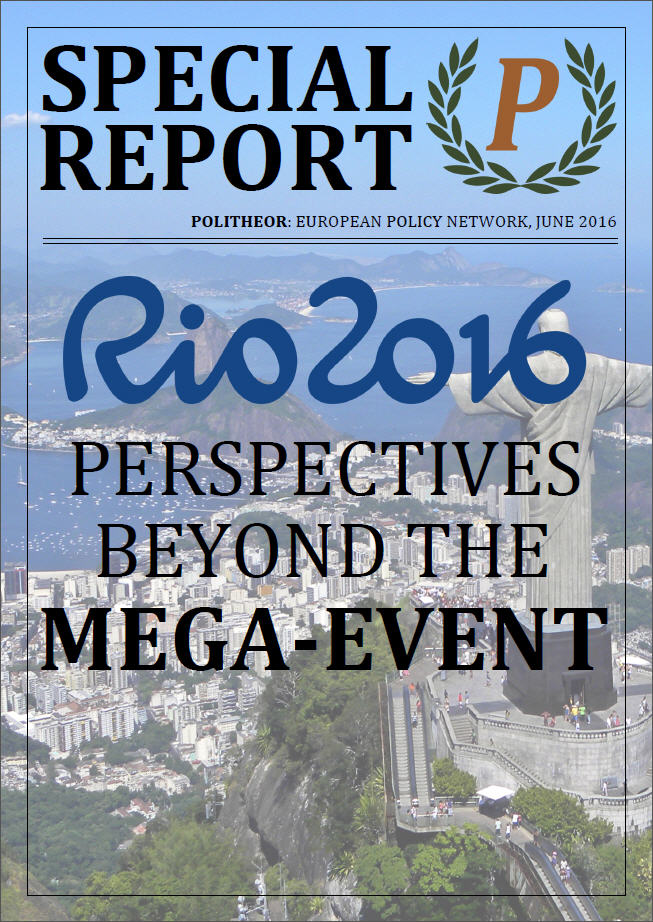Over the past decade Rio has hosted the Pan-American Games (2007), the World Cup (2014), and now, on the 5th of August, the Rio Olympics will kick off. Not only is Rio de Janeiro the first Latin American city to host the Games, but it also differs vastly from Barcelona and Los Angeles in size, economy and society. It’s a mega-city with a metropolitan area that counts over 12 million people, that copes with a stubbornly persisting social divide, and that is already one of the tourist hot spots on the globe.
Editor: Simon Marijsse
Authors: Irene Zugasti, Simon Marijsse, Louise Montgomery, Crystal Chow, Cedric Algoed, Tereza Maarova, Melina Monjour, Izza Tahir, Elien Verstraeten, Jakub Rusek, Tine Stausholm, Janice Perlman
Download Link:
http://politheor.net/wp-content/uploads/2016/06/Politheor-SR-June16.pdf
Since the 1984 LA Olympics, the Games have gone hand in hand with attracting foreign investment capital, boosting tourism and constructing large scale infrastructures. 8 Years later, the Barcelona Olympics presented us with an even larger story of visual promise and urban transformation. Post-Olympics Barcelona started to symbolize the blueprint for urban regeneration.
Consider Rio de Janeiro. Over the past decade Rio has hosted the Pan-American Games (2007), the World Cup (2014), and now, on the 5th of August, the Rio Olympics will kick off. Not only is Rio de Janeiro the first Latin American city to host the Games, but it also differs vastly from Barcelona and Los Angeles in size, economy and society. It’s a mega-city with a metropolitan area that counts over 12 million people, that copes with a stubbornly persisting social divide, and that is already one of the tourist hot spots on the globe. Simply applying the Barcelona model to Rio has unfortunately revealed its deleterious consequences over the past months. Is there a way to make these global events more sustainable in itself or to use them as a stepping stone to build our inclusive cities of the future?
In between the large, dreamy billboards and the newly constructed impressive Olympic stadiums and hotels, lies the shady realm of house removals, ecological threats and social exclusion. Yet this is not the only story. More than ever has Rio shown how mega-events also foster community solidarity, raise social mobilization or put important, often neglected, issues back to the foreground. In this Special Report, ten opinion articles tackle, each from within their policy field, the changes, failures and new initiatives that occurred over the last months in Rio. To understand these changes within a wider context, Dr. Janice E. Perlman shared with us her expertise on public policy and urban planning, and voiced her concerns on what she sees to be happening now and what to expect for and aspire to beyond the Olympics.
11 comments













11 Comments
Janice Perlman: “There are so many things in Rio that are never talked about and that are absolutely heroic.” | Politheor
29/06/2016, 12:09 am[…] Politheor’s Special Report on RIO 2016: Perspectives beyond the mega-event International Affairs […]
REPLYThere is something –missing– about Brazil: Women, social protest and massive sports events | Politheor
30/06/2016, 3:16 pm[…] Politheor’s Special Report RIO 2016: Perspectives beyond the mega event […]
REPLYThe unexpected champion: How Rio’s favelas strive to go green while Olympic legacy falls short | Politheor
01/07/2016, 12:15 pm[…] Politheor’s Special Report RIO 2016: Perspectives beyond the mega event […]
REPLYThe Rio Olympics: Green or a Greenwash? | Politheor
04/07/2016, 1:16 am[…] Politheor’s Special Report RIO 2016: Perspectives beyond the mega event […]
REPLYRio 2016’s Unenduring Legacy | Politheor
04/07/2016, 1:24 am[…] Politheor’s Special Report RIO 2016: Perspectives beyond the mega event […]
REPLY